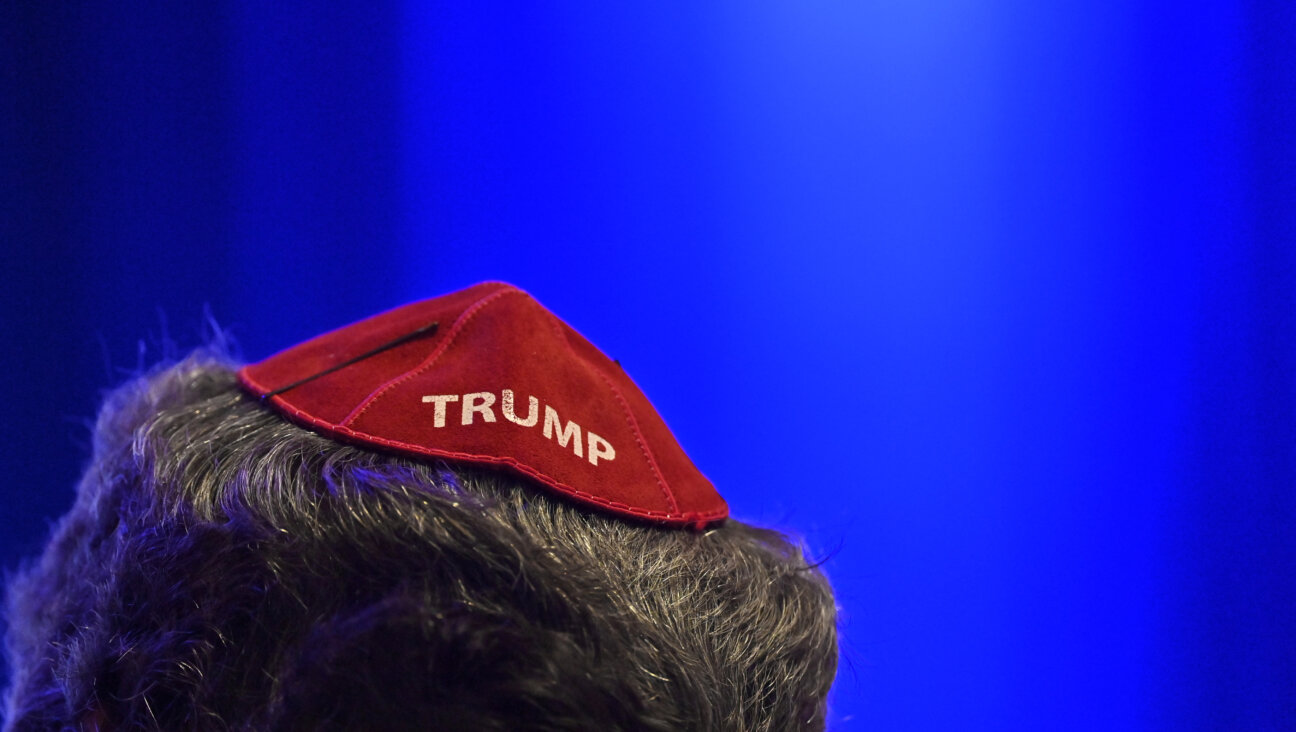Special ReportDoes Germany offer a model — or a warning — for how the US should fight antisemitism?
Germany has taken an aggressive approach toward contemporary antisemitism. Some question whether it’s working
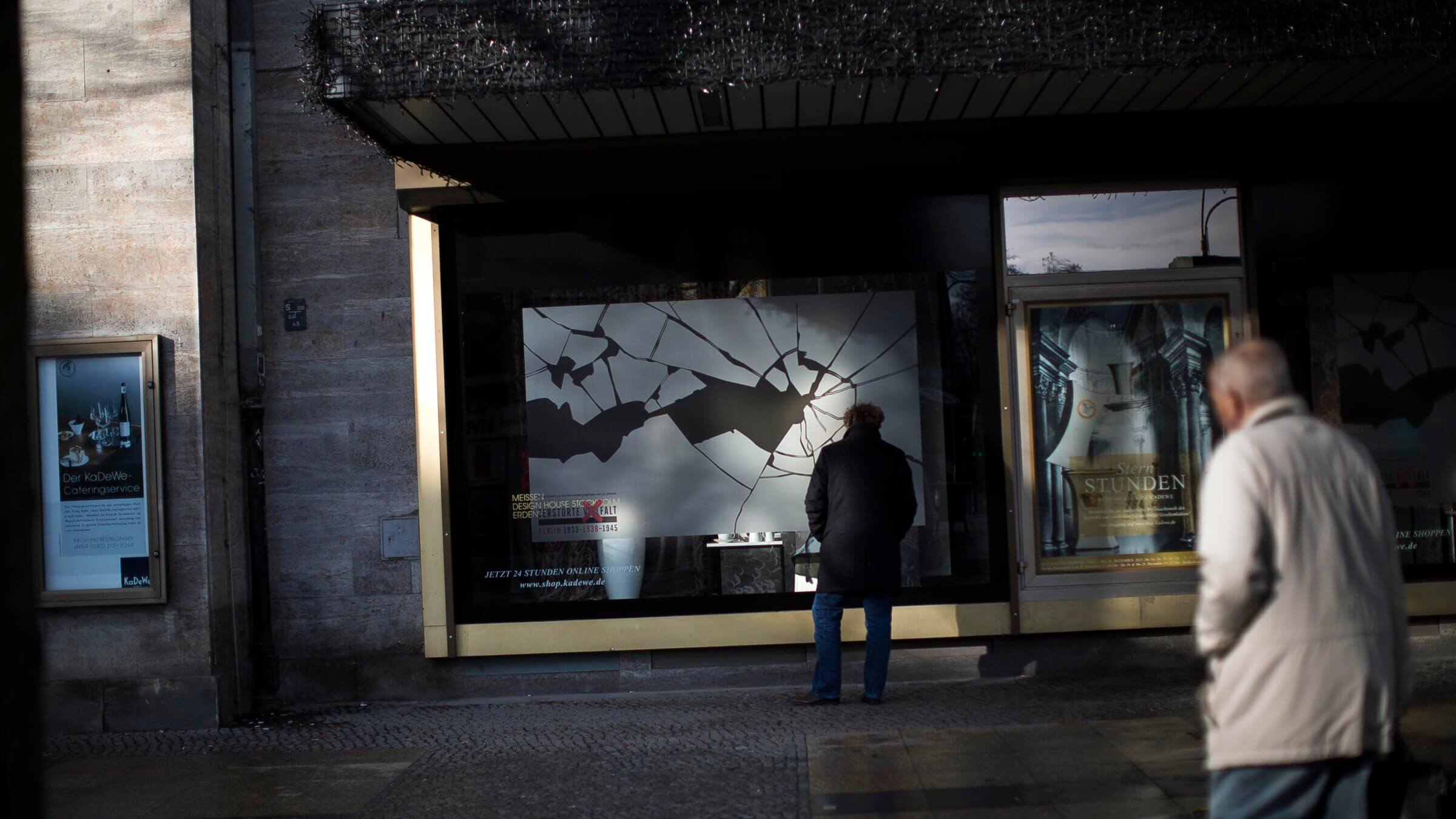
People walk past a Berlin window display commemorating the 75th anniversary of the Kristallnacht pogroms 2013. Germany has won plaudits confronting Nazi crimes, and American officials have turned toward the country for lessons about how to defeat contemporary antisemitism. But some critics sorry that Germany’s approach might not be a good fit for the U.S. Photo by Getty Images
BERLIN — Felix Klein, Germany’s federal antisemitism commissioner, was riding high when I met him last spring. The Biden administration had sent a delegation to seek his help as they created a national strategy to counter antisemitism. Then the White House invited him to Washington to offer more counsel.
“Our work today is about trading notes, sharing best practices, and determining next steps,” Doug Emhoff, the second gentleman, who also led the European delegation, said during the February meeting at the White House. “Your efforts will help inform ours.”
Klein said he thought it “incredible” that Emhoff and other top officials had taken such an interest in Germany, where the Nazi regime carried out a genocide of a third of the world’s Jews during the Holocaust. But perhaps it shouldn’t have come as a surprise.
Germany has won plaudits for confronting its antisemitic history. Its response to contemporary antisemitism has won similar praise, including from the American Jewish Committee, which has pitched the approach of several European countries to the U.S. and helped organize the White House meeting between Emhoff, Klein and several other European envoys.
Unlike the United States, where the special envoy for antisemitism is charged to focus on foreign affairs, Germany’s Beauftragter der Bundesregierung — or federal commissioner — has focused on domestic antisemitism since the post was created five years ago. Each of Germany’s 16 states have their own commissioners, as do many cities, prosecutorial offices and police departments, who work closely with Jewish leaders, run educational programs and even shut down public events deemed hostile toward Jews.
But perhaps the most powerful tool in the arsenal of Klein and his German colleagues is shame.
“Fortunately in Germany, public pressure is still very high when someone is called an antisemite,” Klein told me. “It is very problematic for this person.”

The Holocaust is viewed as modern Germany’s original sin and allegations of antisemitism carry an even more severe stigma than they do in the U.S. Such claims have cost people jobs and cultural institutions funding, and the country’s foreign policy toward Israel has often been guided by a desire to atone for crimes of the Nazi regime.
Many experts praise the resources that Germany has put behind combating antisemitism. But some also warn that the deep disgust antisemitism evokes in Germany can be misdirected, especially when officials policing speech around Israel takes precedence over defeating the traditional forms of antisemitism.
“Their ideas are mainly about how to control speech,” Yossi Bartal, a progressive activist in Berlin, said of the antisemitism commissioners. “Germany is a warning sign and I would be very much against anyone taking lessons from it.”
Others, who support the government’s classification of anti-Zionism as antisemitic, see other reasons for pause. The heavy-handed role that the country’s robust bureaucracy plays in tamping down antisemitism can convey that antisemitism is a problem the average person doesn’t need to worry about. Another risk: that the campaign against antisemitism turns into a partisan issue that opponents of the government can ignore or even denigrate.
“We can’t just take what’s happening in Europe and plop it down here,” said Holly Huffangle, who oversees the AJC’s antisemitism work.
As the White House prepared to release and implement the most ambitious federal government plan to combat antisemitism in American history, I traveled to Germany to see what U.S. officials hope to learn from their counterparts and what the limitations of their approach can teach Americans grappling with rising antisemitic threats.
Jewish ‘normalcy’ hard to find in Germany
One thing that came up repeatedly in my conversations with Jewish leaders in Germany was how strange it is to be a Jew in the country.
Part of this is about numbers. Jews are relatively scarce in Germany and many Germans have never met one. More than 500,000 Jews lived in the country before the Nazis took over in 1933. After the Holocaust, 37,000 remained.
The Jewish community in Germany has slowly rebuilt itself. Today it’s home to 120,000 Jews — a tenth of a percent of the population. Many reckon as much with inappropriate fawning and strange comments as they do with antisemitism. Often Jews can feel objectified. A state program to recruit Jewish immigrants literally calls the process “reforesting.”
And it’s not uncommon for a German in conversation with a Jew to pause and apologize for the Holocaust, or worse, announce that their family did nothing wrong during the Holocaust and they don’t feel any guilt. “Jew” also remains a common playground slur at schools, where the small number of Jewish students often stand out.
A recent book compiling Jewish experiences with antisemitism in modern Germany includes the jarring tale of a woman who was sitting at a cafe when two men at the next table over stood up to leave. They exchanged farewells: “Bis zu den Gaskammer.” The expression means “until the gas chambers,” but the friends seemed to be treating it like “see you later.”
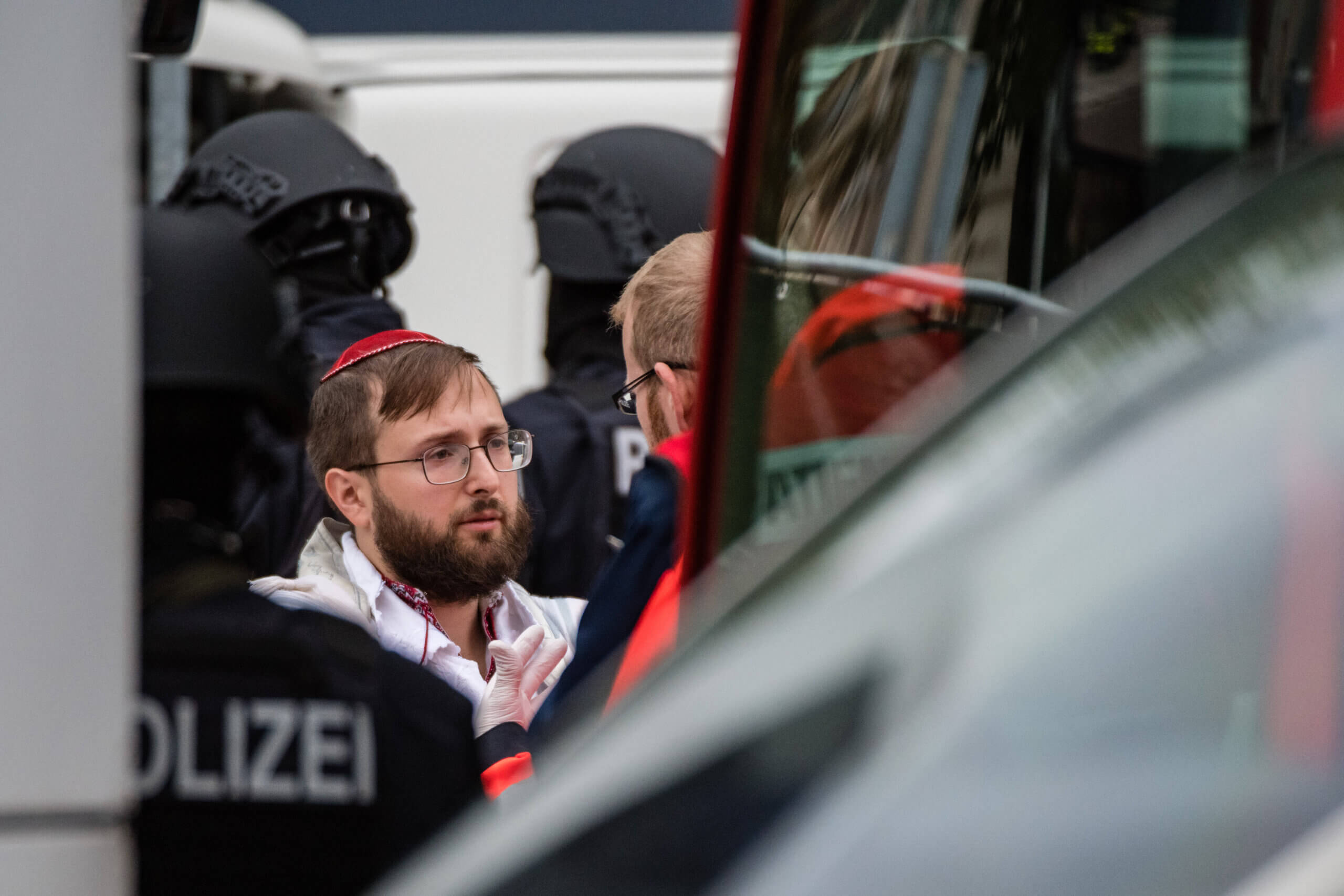
Rabbi Jeremy Borovitz helps run Hillel Deutschland and was at a synagogue in a city south of Berlin on Yom Kippur four years ago when a white supremacist unsuccessfully attempted to shoot his way into the building. He recalled the police bringing a nun to comfort the Jews sheltering inside.
Borovitz used to wear a baseball cap most of the time, but since the shooting he has made a point to wear his yarmulke in public, a rebuke to those who want a Germany without Jews. He gets occasional antisemitic comments and people have spit on the ground in front of him.
Still, Borovitz is loath to talk about antisemitism these days, because it seems like it’s all anyone wants to talk about with him. “We’re trying to focus on building Jewish life,” he said.
Although it’s not typically understood as part of the problem with antisemitism in the country, perpetually standing out is taxing for many German Jews. Official government programs have tried to remedy this with programs with names like “Rent-a-Jew,” where Jews visit different communities to answer questions.
This is not as much of a pressing problem in the U.S., which is home to 7.6 million Jews. Roughly two-thirds of Americans say they know at least one Jewish person, and unlike in Germany, Jews make up a sizable share of the population in many large U.S. cities.
Ruben Gerczikow, an analyst for the AJC in Berlin, said that the German emphasis on “remembrance culture” around the Holocaust — though important — sometimes obscured the contemporary experience of Jews living in the country.
“You can’t divide Jewish life in Germany today from the Shoah,” he told me. “The shadow of Auschwitz is all over.”
Focus shifts from neo-Nazis to Israelbezogener Antisemitismus
In opinion polls taken in the years after the Holocaust, 40% of West Germans expressed antisemitic beliefs. Those numbers fell with time, and younger generations expressed far less antisemitism. Through the 1990s, the consensus held that neo-Nazis on the political fringes posed the most serious threat.
But in recent years, Germany has reoriented itself to focus as much on Israelbezogener Antisemitismus, or Israel-related antisemitism, a trend that experts trace back to the turn of the millennium.
When the Second Intifada broke out in 2000, the protests and terrorist attacks in Israel sent shockwaves through the diaspora as antisemitic incidents soared.
“Everything went to hell,” recalled Ken Stern, who ran the AJC’s antisemitism and extremism division at the time. While the level of antisemitism quickly returned to pre-Intifada levels in the U.S., it continued to grow in Europe. Jewish leaders demanded government action.
Germany’s initial response steered away from contentious political questions about Israel. The government focused on educational programs and worked with the Muslim community to pioneer the “Hamburg Model,” where students from different faiths would study religion together.
The State Department found in a 2004 report that German leaders believed neo-Nazis were the biggest problem, pointing to street assaults and a thwarted plot to bomb a Jewish community center. But threats related to Israel continued to loom large in the eyes of many Jews, who worried about young Muslim men — many of them recent immigrants — vandalizing synagogues and community centers and assaulting Jews as a way to vent their anger toward the Jewish state.
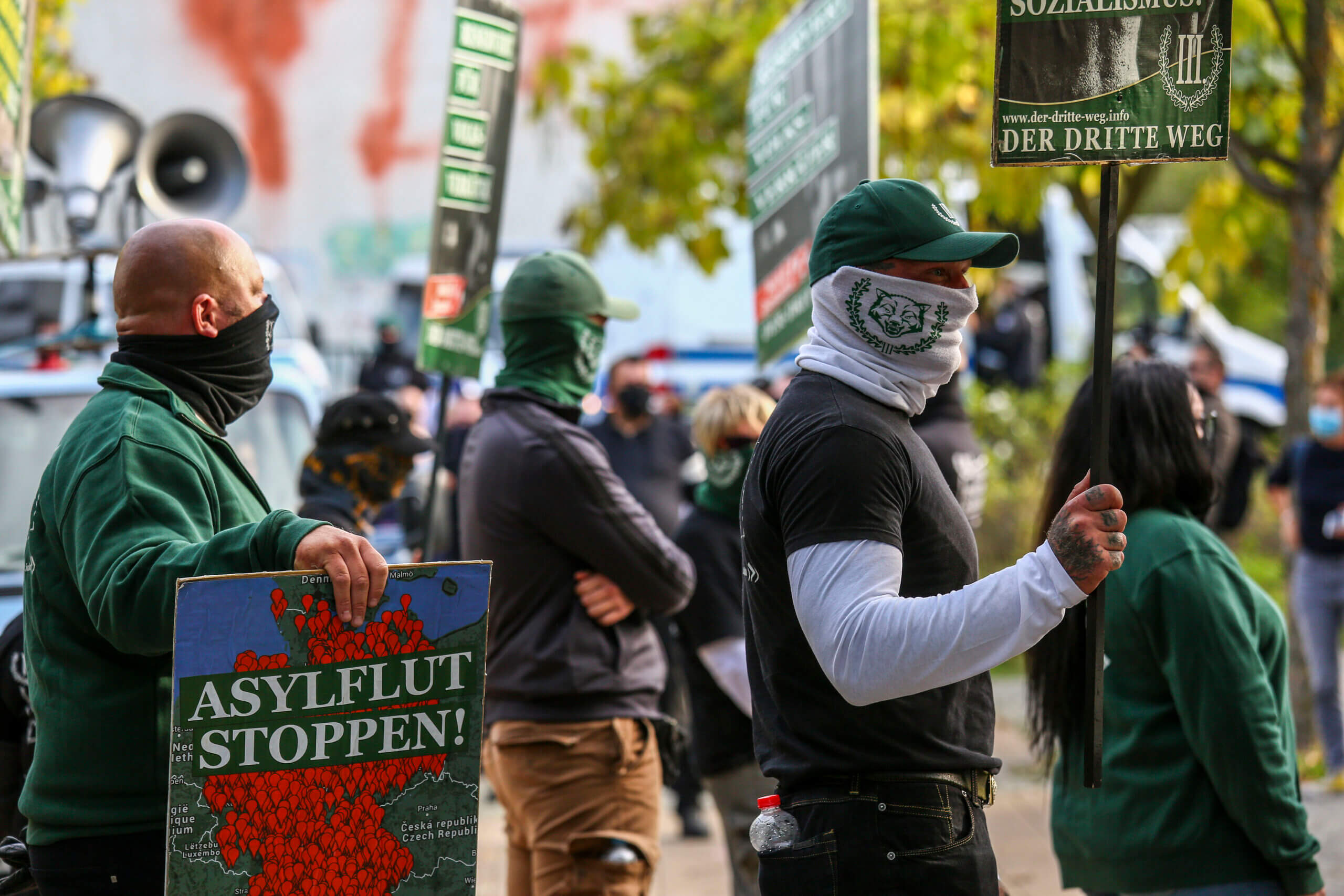
As many as 90% of antisemitic crimes in Germany are still attributed to right-wing extremists. A recent surge came during protests against pandemic health measures and the Reichsburger movement, a network of far-right agitators who attempted a coup d’etat last winter, highlighting a white supremacist undercurrent among some members of the security services. The Alternative for Germany, a right-wing populist party, holds about 10% of the seats in the German Parliament and has racked up recent election victories.
But the Israeli government and many leading Jewish organizations have successfully encouraged a shift away from focusing narrowly on the far-right, pushing foreign governments to adopt a view of antisemitism that includes things like holding Israel to a double standard. At the same time, a spike in Middle Eastern immigration to Germany, including thousands of Palestinian-Syrian refugees, has swelled the ranks of those protesting Israel and, sometimes, spewing antisemitism.
Over the last decade, Israel’s critics have found themselves caught in a pincer between mainstream Jewish organizations in the country that believe their opposition to Zionism is a thin mask for antisemitism and far-right populist parties who have gained momentum by hammering the new Arab immigrants on any issue that resonates with voters, including allegations of antisemitism.
The Department for Research and Information on Antisemitism, known by its German acronym of “RIAS,” was founded five years ago following the firebombing of a synagogue during protests against Israel. The nonprofit has since become the source of official government data on German antisemitism. It relies on the International Holocaust Remembrance Alliance’s working definition of antisemitism, which has been embraced by many leading Jewish groups even as it generates controversy for its classification of anti-Zionism as antisemitic.
RIAS deemed a Palestinian demonstration two years ago in the southeastern city of Regensburg antisemitic in part because speakers accused Israel of apartheid and a sign read “stop the killing of children in Palestine.” RIAS said it invoked the age-old blood libel conspiracy against Jews. The organization also regularly counts protests where “apartheid” is mentioned in reference to Israel.
There is no American equivalent to RIAS, a private advocacy group that also serves an official government role. In the U.S., media and advocacy groups typically rely on FBI data, which only tracks anti-Jewish incidents that rise to the level of crimes and is often criticized as incomplete. The Anti-Defamation League also releases an annual audit of incidents.
Much of the recent concern around increased antisemitism in the U.S. can be traced to the violence in Israel and Gaza two years ago, which fueled a surge of hostility toward Israel around the world. But the White House’s plan to create a strategy for countering antisemitism came in the aftermath of antisemitic comments by Kanye West, the performing artist who now goes by Ye, and officials did not directly connect it to Israel. The question of when demonstrations and aggressive rhetoric targeting Israel should be considered antisemitic remains a much more open question in the U.S. than Germany.
Despite classifying anti-Zionism as a form of antisemitism, the ADL rarely includes demonstrations against Israel in its annual count and the organization says it makes a distinction between different types of anti-Zionism.
“What I’m talking about is not the Palestinian who was displaced from their village in 1948,” Jonathan Greenblatt, the group’s director, told The New Yorker. “I’m not debating or questioning the authenticity of an indigenous Palestinian person who’s living in the West Bank who feels impinged upon by the Israeli state.”
The nuance of this American approach seems to be largely missing in Germany.
Palestinian activists feel silenced
I met Ramsis Kilani, a 31-year-old activist, at a sweet shop on Sonnenalle, a main thoroughfare in Berlin’s Neukolln borough known for its large population of Arab immigrants. Over black tea and plates of knafeh, the cheese-based Palestinian pastry, I asked Kilani whether Germans were more lenient when Palestinians spoke out against Israel.
He said no.
“The repression against Palestinian voices and other people of color — migrants, international artists and so on — is even more severe than if a German person says something like this,” Kilani said.
Kilani was born in southern Germany to a white German mother and a Palestinian father, who eventually returned to live with family in Gaza, where he was killed in an Israeli airstrike alongside five of Kilani’s siblings in 2014. That tragedy doesn’t seem to have bought Kilani much sympathy in Germany.
Two years ago, he was invited to contribute to an anthology called “Frenemies,” meant to feature diverse perspectives on antisemitism and racism from both Jews and Palestinians. But when the other authors learned that an apparent supporter of BDS would be included in the volume, they protested and Kilani’s contribution was scrapped — leaving the book without any Palestinian voices.
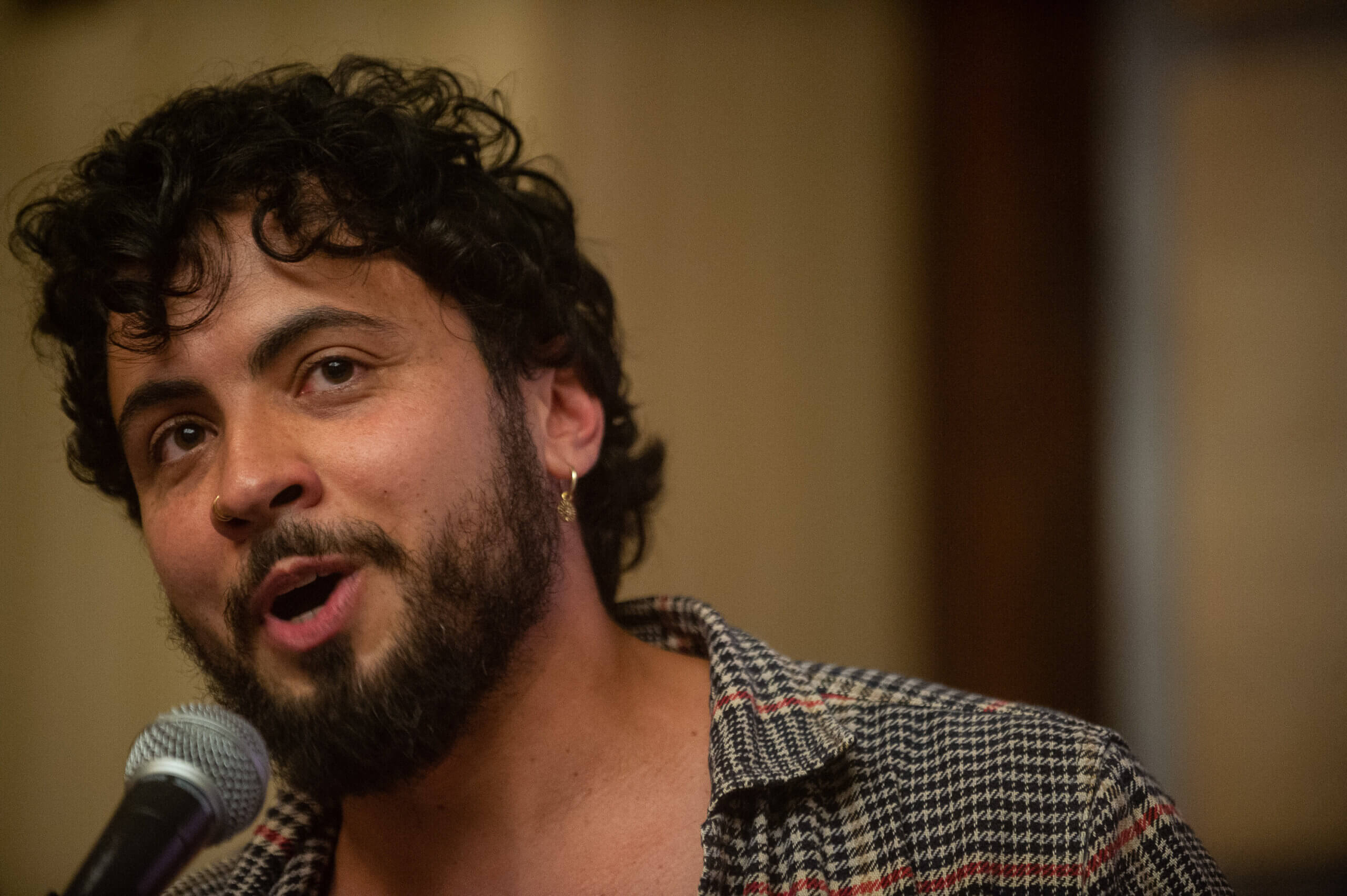
Klein, the antisemitism commissioner, told me that he did not consider who was expressing a view about Israel when it came to determining whether it was antisemitic. “It doesn’t really matter,” he said.
I pointed out that many American Jews hold positions that he believes are antisemitic, like the roughly one-quarter who believe that Israel is an apartheid state, and asked him if it wasn’t a bit strange as a non-Jewish German to be telling Jews that they are being antisemitic?
“It’s a bit odd, of course, absolutely,” he said. “And yet, I call out any form of antisemitism.”
The combination of a government bureaucracy that classifies strident criticism of Israel as antisemitic, along with a persistent strain of blatant antisemitism among supporters of the Palestinian cause in Germany, has led many people in the country to write off every activist protesting against Israel.
“I wouldn’t say that all of them are antisemitic,” said Gerczikow, the AJC analyst. “But they’re tolerating antisemitism.”
Gerczikow and others point to the kind of behavior at past demonstrations that is almost unheard of in the U.S. One of the most famous examples came nearly a decade ago when protesters in Dortmund and Frankfurt chanted “Hamas, Hamas, Jews to the gas!”
With a few exceptions, Palestinian activism in the U.S. is tied to the world of progressive politics, which prides itself on promoting minority rights. That is not always the case in Germany, where political Islam has a stronger foothold and both Turkey and Iran seek to influence their citizens living in the country, including by sponsoring events like Al-Quds Day and funding mosques that spread propaganda. Some activists said antisemitic incidents in German neighborhoods with large Turkish communities seem to ebb and flow depending on how well the government in Ankara is getting along with Israel.
Bartal, the progressive activist who immigrated to Germany from Israel almost 20 years ago, said he was almost beaten up at a Berlin street demonstration against Israel in 2014 by a Turkish immigrant because he is Jewish. “Those things happen during escalations of violence in Israel-Palestine,” said Bartal, an organizer with the Diaspora Alliance in Germany, which has pushed back against efforts to define anti-Zionism as antisemitic in Europe and the U.S.
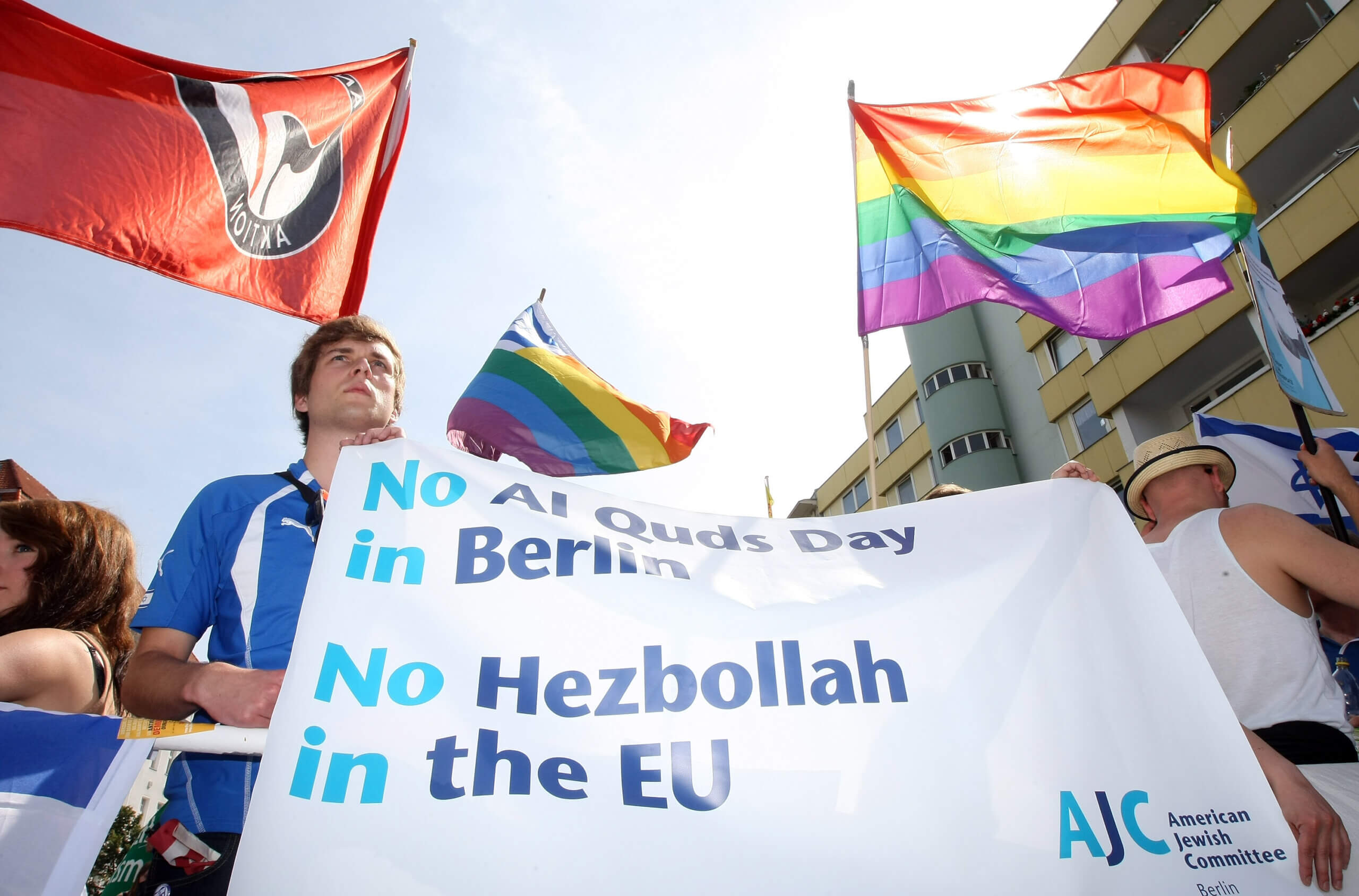
A group of hard-line Turkish nationalists called Grey Wolves are active in Germany, and some blame its adherents for the antisemitic outbursts at demonstrations. “You have very right-wing Turkish people who support Palestine,” said Ahmed Abed, an attorney who represents Palestinian activists.
Abed said that when the rare antisemitic slogan is heard at rallies, organizers will approach the individuals responsible and ask them to stop. “Most people don’t do this because they know they are doing something racist, they just do it because maybe they’re from a society where it’s normal to say something like this,” he said. “Sometimes people are really, really, really saying something that’s not OK — and then they have to go.”
But Bartal, Abed and others chafe at the fact that almost every Palestinian gathering is now tracked by watchdog organizations like Democ, a small nonprofit focused on what it describes as “anti-democratic movements,” which produces videos of demonstrations amplifying any signs of antisemitism. Several Jewish outlets reported that an April protest in Berlin featured demonstrators chanting “Death to the Jews.”
Democ’s video from the event shows what appears to be a single man briefly shouting the phrase, while also highlighting more conventional slogans like “Free, Free Palestine!”
“Legitimate Palestinian concerns are put together with forms of ‘Israel criticism’ that do slip into antisemitism,” Bartal said.
Banning BDS
The federal parliament, known as the Bundestag, passed a resolution in 2019 declaring that the Boycott, Divestment and Sanctions movement targeting Israel was antisemitic and vowing to cut off state funding to any organization that supported it.
The movement is also controversial in the U.S., in part because if successful it could effectively erase the Jewish majority in Israel, and leading American Jewish organizations have described it as antisemitic. But many who freely criticize Israel in the U.S. don’t support BDS. J Street, the liberal “pro-Israel, pro-Palestinian” group, regularly states its opposition to BDS, and even some leftist organizations, like IfNotNow, have no official stance on it.
In Germany, though, “BDS” is used to refer to a huge swath of activists, academics and others who are sympathetic to the Palestinian cause, even if they have never called for a boycott. “The chain of suspicion is almost uncontrollable,” said Bartal.
One of the people trying to stop what they view as the unfair smearing of Palestinian activists is Abed, a labor lawyer who represents many activists and is currently behind a long-running lawsuit against the Bundestag’s anti-BDS resolution.
Over lunch at an Indian restaurant around the corner from his Berlin office in Neukolln, Abed, a trim man in wire-framed glasses, exhibited the kind of nervousness I had become accustomed to while speaking to people about antisemitism and Israel in Germany.
He asked to record our conversation on his own phone before answering questions. But he was also proud of his recent work and brought a copy of a press release celebrating that a court decision that found Uwe Becker, the former mayor of Frankfurt and a current antisemitism commissioner in the region, had “inadmissibly discredited” a Jewish activist in the city by accusing her of antisemitism for supporting BDS.
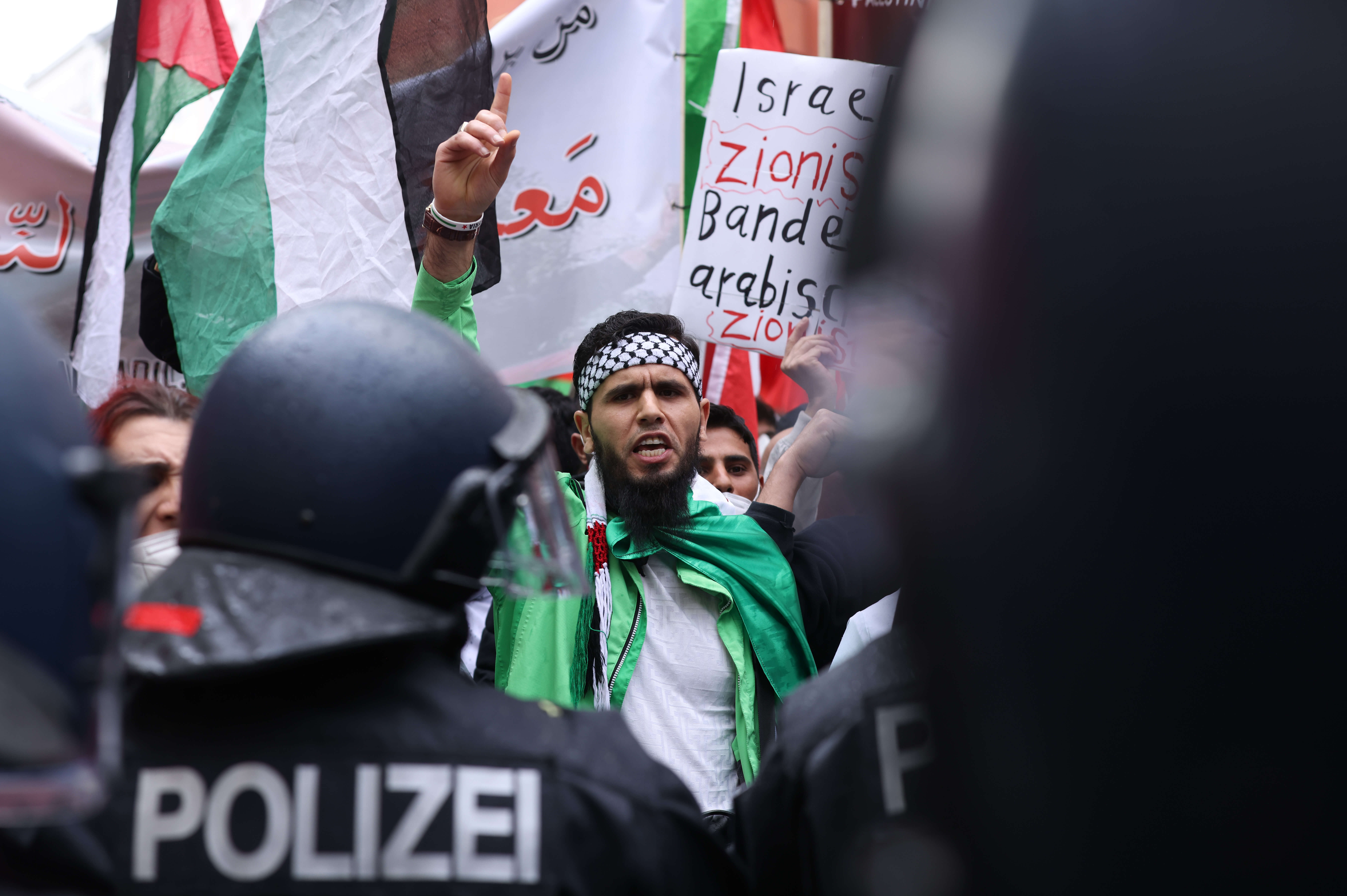
Abed said the courts had been sympathetic to his legal arguments, describing cases where judges reversed attempts by local authorities to ban Palestinian events from public venues. But many of the police bans on political demonstrations have been upheld. And Abed can’t file lawsuits over everything.
A typical scene played out in May when police banned several Palestinian protests to commemorate Nakba Day, marking what they consider to be the “catastrophe” of Israel’s founding in 1948, ruling that they could lead to “antisemitic incitement of the people.” Ultimately only a gathering of anti-Zionist Jews was allowed to proceed and police broke the event up shortly after it began.
These so-called “demo bans” are a new phenomenon. The Nakba Day gatherings were first prohibited last year, and other events — including two protests on behalf of Palestinian prisoners in April — have been canceled by police who cite the potential for “antisemitic exclamations” and a risk of violence. The antisemitism commissioners have played a role in banning the events, according to a recent article in Jewish Currents.
Abed said that many government agencies also threaten cultural institutions with a loss of funding if they allow events with connections to Palestinian activism. Officials often cite the Bundestag’s resolution, which is not legally binding but says that state funds should not go to anyone who supports BDS.
“Somebody from the public administration writes an email and says, ‘Well this is not in-line with the resolution, it’s not allowed, you have to cancel this,’ even though it’s not a law,” said Abed, who is also a local council member in the neighborhood. “But the effect is almost the same.”
The European Legal Support Centre, a pro-Palestinian nonprofit, published a report in June that documented 11 recent cases where the IHRA definition had been used to stymie German activists. Incidents included a museum in Munich that blocked an event about the city’s anti-BDS resolution, a university that pulled funding for a project by Jewish students called School for Unlearning Zionism, and a bank that closed the account of Jewish Voice for Just Peace in the Near East, a left-wing group opposed to the Israeli occupation of the West Bank.
But while those caught up in this dragnet say that it has become almost impossible to engage in Palestinian activism in Germany without facing legal harassment and risking professional ruin, many Jewish leaders believe antisemitism — thinly veiled as anti-Zionism — is surging in street demonstrations and in the country’s arts scene.
Daniel Bottman, director of the Central Council of Jews in Germany, pointed to Documenta, a massive art exhibition that was embroiled in several controversies over antisemitism and Israel. The flap eventually led to a major piece of art being removed and the show’s director stepped down.
Bottman said those incidents underscored the need to draw firm lines around public expression in Germany, which has a different approach to free speech than the U.S.
“In Germany — and I think it’s very right — it’s not possible to say everything,” Bottman said.
A backfiring approach?
Though they looked to Germany for solutions on how to address antisemitism, American officials ultimately pursued a strategy distinct from their European counterparts. The White House plan released in May featured many of the same basic tenets as the German plan, including calls to improve data collection, education and security measures. But on some of the most contentious issues, it diverged sharply.
American officials took pains to avoid weighing in on political debates over Israel, mentioning the country 10 times over the course of the report, compared to more than 40 times in the German document. Unlike Germany, the U.S. did not pledge to work closely with Israeli officials to implement the strategy.
In addition, the White House report included an emphasis on “cross-community, solidarity-building efforts” and “multi-faith partnerships.” It painted antisemitism as a threat to “all Americans,” arguing that people peddling antisemitic conspiracy theories also target other minority groups.
The German government does not address this idea in its own document. While the White House plan called on federal agencies to respond to antisemitism by increasing accommodation for Jews, Muslims, Sikhs and other religious minorities, the Germans focused more narrowly on Jews. The only mention of Muslims comes in a brief section on addressing “the issue of antisemitism among Muslims.”
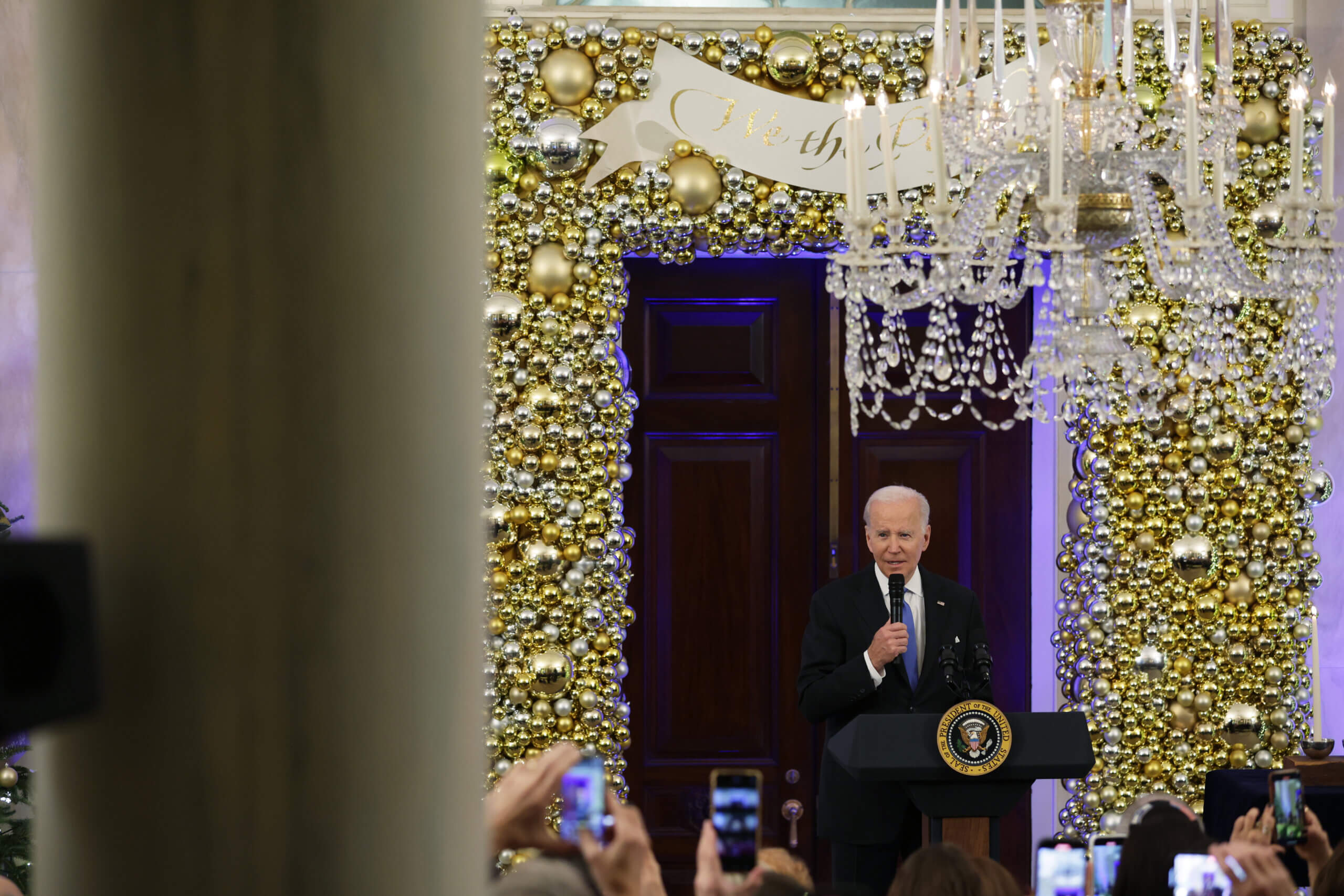
Huffnagle, with the AJC, said it was important to make sure governments worked closely with nonprofit groups with credibility in the communities they serve. She said there was some anecdotal evidence that in France, with more severe cases of antisemitism than Germany in recent years, anger at the government over economic issues has spilled into hostility toward its advocacy on behalf of Jews.
“If citizens hate their government, are they then somehow going to say, ‘Oh, well if the government is for Jewish people…’” she trailed off.
The White House came under fire for announcing that the Council for American-Islamic Relations would help implement its plan to counter antisemitism. The organization, which is hostile toward Israel, quickly released a statement praising the strategy and noting that it was designed not to “conflate bigotry with human rights activism, including advocacy for Palestinian freedom.”
Kilani, the German activist, suggested that kind of inclusive strategy to fight antisemitism could go a long way in Germany. He said that part of the reason there were more incidents of explicit antisemitism — slurs shouted at protests, demonstrations against Israel outside synagogues and the like — in Germany than the U.S. was that the German government often acts like speaking out against Israel and against Jews are the same thing.
He said some of the worst perpetrators are “rogue youth,” teenagers from the Arab neighborhoods of Berlin who believe they have been presented with a choice between supporting Israel or being antisemitic. Without more of an effort to distinguish between respecting Jews and supporting the Israeli government, some of these teens have chosen to denigrate both.
“Not to excuse it,” he said. “But there is an explanation of why it’s worse here.”
A message from our Publisher & CEO Rachel Fishman Feddersen

I hope you appreciated this article. Before you go, I’d like to ask you to please support the Forward’s award-winning, nonprofit journalism so that we can be prepared for whatever news 2025 brings.
At a time when other newsrooms are closing or cutting back, the Forward has removed its paywall and invested additional resources to report on the ground from Israel and around the U.S. on the impact of the war, rising antisemitism and polarized discourse.
Readers like you make it all possible. Support our work by becoming a Forward Member and connect with our journalism and your community.
— Rachel Fishman Feddersen, Publisher and CEO









